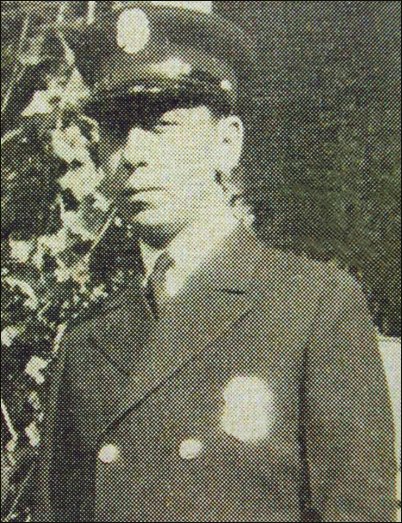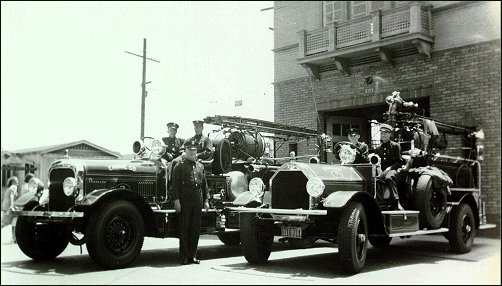|
|
|
|
Wilbert Vogel was born March 31, 1899 at Pittsburgh
Pennsylvania. He grew to manhood and at the age of eighteen he
enlisted in the U. S. Army, serving in the World War with Battery
F-107 Field Artillery. He was honorably discharged as a First
Class Private on May 21, 1919. THE GRAPE
VINE
AUGUST 30, 1937 |
|
|
By Bill Goss THE hot, drying air hung over everything like a pall and even the occasional gusts of wind served only to increase the day's discomfort. The date was August 3, 1937, and it was a day that firemen just naturally dread, especially the signal office charged with the responsibility of sending adequate assignments to all alarms and keeping proper coverage on the rest of the city. On this particular day the temperature was well up on the very warm side and the humidity down and fires were going in all parts of the city, among them a couple of two baggers. Engine 7 had just returned from a run, to the quarters of Engine 15, where they had moved up earlier in the afternoon upon the transmission of a greater alarm, when they were notified to return to their own quarters at Twenty-fourth and Maple. As the rigs of this two-piece engine company made their way east across town the men could see little columns of smoke arising through the hot air in practically every direction. One of the fellows spoke up and said: "We'll be lucky if we get through this day without a good one." It was close to 3:10 p.m. as "Pop" Newman, 7's engineer, was backing his pump into quarters, when Acting Captain Owen Hamlin came running out of the house's office and called: "Hold it, fellows, we have one at 1276 West Twenty-ninth street to take in." Sirens roared and the company headed back in the direction they had just come, for this address was hardly a stone's throw from 15s. Rolling west along Twenty-ninth street it soon became apparent that this was to be a real work-out. Dead ahead was an old church, wooden construction, high peaked shingle roof, with a steeple in the front that rose to a height of forty feet above the ground. The fire was digesting the top half of the church in great gulps of flaming fury, and it looked as if the whole southwest corner of Twenty-ninth and Orchard was ablaze. Slowing down a short ways east of the fire on Twenty-ninth Hamlin called for a line to be laid from the hydrant there. Hardly had he spoken when Fireman Wilbert Vogel was off the rig with a loop of hose and as the wagon proceeded down the street he and "Pop" had the pump connected up and ready to go in a matter of moments, for this was a crew that functioned together like a well-oiled machine, everything just clicked off. ' In front of the fire Hamlin noted that 7s was the only company
there as yet and decided to go into the front door and head the fire off from that point.
Firemen Ferdinand "Fritz" Hayman and Tommy Mize quickly laid out the necessary
sections, put on a nozzle and headed in to the main entrance of the church. The minute
they stepped inside they were in it, as fire was all over the place, especially above and
ahead of them, but Mize on the nozzle and Hayman backing him up, made every drop of water
count and they were soon boring their way in. |
|
|
Acting Battalion Chief McKee of Battalion Four, now in command of the operations as the fire, went into the entrance of the church to find out what had happened, discovered that a heavy 5x5 timber extending up through the steeple to form a flag pole on top had crashed down through the second floor choir loft and onto the men working in the entrance hall of the church when its supports had burned away. As it fell part of its force was taken up by the flooring of the second story and the ceiling of the first floor hallway. Nevertheless the barrage of rubble knocked the men down and the big beam struck Hayman a glancing blow and hit Vogel full force. The ambulance from the nearby University police station took the two men to the Receiving Hospital where it was found that Vogel was far more seriously injured than had been realized. His ribs on the right side from the second to the seventh were fractured in the frontal region and the second to ninth ribs in the area next to the spine, in short his chest was crushed. Rescue 23 erected an oxygen tent over him at the hospital but despite this and all the efforts of the best men of medical science, internal hemorrhaging continued and traumatic pneumonia set in. Finally, overwhelmed, Wilbert Vogel passed away at 9:55 a.m., August 9, 1937. Wilbert Vogel was born Mark 31, 1899 in Pittsburgh, Pennsylvania. At the age of eighteen he enlisted in the U.S. army, serving in World War I with Battery F, 107th Field Artillery. He was discharged from the army on May 21, 1919. Vogel was appointed to the Los Angeles Fire Department on November 2, 1928, and had the reputation of being a fine and efficient fireman where ever he served, which was largely in Battalion Four. He was survived by his widow, Mrs. Arvilla Vogel, daughter Florence, now 21, two sons, Wilbert O., Jr., 18, now in the U.S. Navy at San Diego, and George A. Vogel, a young man of 15. Funeral services were held at Edwards
Brothers chapel on Venice boulevard, in chapel of Bishop Leslie G. Anderson of
the Manchester Ward of the Church of the Latter Day Saints, of which Mr. Vogel
was an Elder. Interment was at Inglewood cemetery in charge of the chaplain and
the honor guard of American Legion Post No. 102. |
The Firemen's Grape Vine, January 1945
LAFIRE.COM
Copyright 1999 All Rights Reserved.

